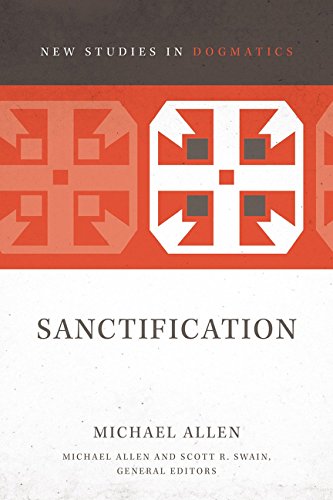A Brief Book Summary from Books at a Glance
By Mark Baker
About the Author
Michael Allen (PhD, Wheaton College) is the John Dyer Trimble Professor of Systematic Theology at Reformed Theological Seminary in Orlando, Florida. He has authored many books including Justification and the Gospel.
Overview of the Series
Michael Allen and Scott R. Swain serve as co-editors of the New Studies in Dogmatics series. The series “follows in the tradition of G.C. Berkouwer’s classic series, Studies in Dogmatics, in seeking to offer concise, focused treatments of major topics in dogmatic theology that fill the gap between introductory theological textbooks and advanced theological monographs” (15). It further seeks to engage in constructive theology through the process of renewal through retrieval. Retrieval “is an inclusive and enlarging venture, a matter of tapping to a vital root and, in some cases, of relearning a lost grammar of theological discourse, all for the sake of equipping the church in its contemporary vocation to think and speak faithfully and fruitfully about God and God’s works” (16). Each book in this series aims to do four things: (1) to engage with the “state of the question” of the particular topic; (2) to interact with biblical-theological and exegetical patterns that form the particular doctrine; (3) to give attention to ecclesiastical statements of the church and leading theologians; (4) to locate the doctrine within the larger system of theology as well as in practical application.
Overview of the Book
This book seeks to retrieve the doctrine of sanctification by specifically locating sanctification in the context of other doctrines of the Christian faith. While sanctification is distinct from the doctrine of the incarnation or justification, sanctification can only be truly understood through an analysis of its relationship with these other doctrines.
Table of Contents
- Sanctification and the Gospel
- God
- Creation
- Covenant
- Incarnation
- In Christ
- Justification and Sanctification
- Grace and Nature
- Grace and Responsibility
- Grace and Discipline
Book Summary
Chapter 1: Sanctification and the Gospel
This book approaches sanctification from a specific angle; namely, sanctification through the lens of the gospel. Sanctification, or the pursuit of holiness, is not just a cultural experience; it is something that is real, and it is real because it is rooted in God himself. Sanctification is “located” in the gospel; the gospel is what gives our sanctification meaning and context. Therefore any study of sanctification needs to be broader than just the study of the words associated with sanctification. For example, this kind of study reveals that holiness is both a task and a gift. Holiness is given to us through Jesus, and it is something that we strive for as we are empowered by the gospel. Therefore, contrary to the claims of the Radical Lutherans, the gift of holiness does not discount the need to always be abounding in the work of the Lord (1 Cor 15:58). Sanctification is not just Christ’s example (i.e., Pelagianism); nor is it mere substitution (i.e., cheap grace).
Here is the thesis of this chapter: “The gospel is the glorious news that the God who is himself holy freely shares that holiness in covenant with us and, when we refuse that holiness in sin, graciously gives us holiness yet again in Christ. While justification is the ground of the participation in God, sanctifying fellowship is the goal of the gospel” (34). When we think about our need for sanctification, we must begin with God’s own holiness. God’s holiness not only reveals our lack of holiness but also shows us the sufficient supply of holiness in Christ. As Calvin says, “the whole substance of our salvation is not to be sought anywhere else than in Christ” (37).
Finally, this volume as a whole seeks to do three things through the way the contents are structured. First, it endeavors to connect holiness to other aspects of Christian doctrine. Sadly, many systematic treatments of sanctification say little to nothing about the doctrine’s connection to Christ, justification, or the gospel; this volume aims to fill that gap. Second, this book is “a work of dogmatic theology exercised in the catholic and Reformed tradition” (45). We are standing on the shoulders of Augustine, John Calvin, John Owen, and G.C. Berkouwer, to name a few. Third, this is a work of systematic theology, and therefore it endeavors to glean from the findings of exegetical work and biblical theology in order to address those conclusions to everyday life.
Chapter 2: God
Holiness typically defined either through metaphysics (the “oneness” or “otherness” of God) or through morality (God is righteous and untainted by sin). Most approaches lean towards one aspect or the other; however, it is better to see these two as complementary instead of mutually exclusive. We must begin by seeking to understand God himself. “Doing so may run the risk of speculation, that is, of prying into the inner life of God without substantiation or warrant. But the alternative is ruinous. Failing to consider the inner life of God hinders us from confessing. . .
[To continue reading this summary, please see below....]The remainder of this article is premium content. Become a member to continue reading.
Already have an account? Sign In
